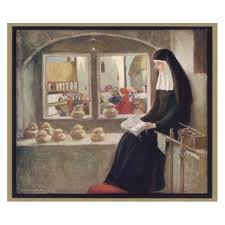If I wanted to describe my outlook on life, I would use a phrase … ‘I celebrate life in all its fullness’. I know it’s a strange phrase, as most of us would reply ‘and so say all of us’. But what does that mean for us as Christians …when we follow a God whose body was mutilated and tortured on a cross through the death of Jesus., Some people may look at their own bodies and feel shame, disgust, and revulsion.
We need to reflect and reclaim what that means for us in the light of ‘Body Theology’.
Our bodies are how we live and move within God’s world. As St Teresa of Avila clams … God has no body but ours, no feet but ours, no hands but ours, ours is the body with which Christ moves.
So what will Christ feel and see if he moves about in my Body!
Well after three hip operations, two children, a life of enjoying good company, friendships, food and fellowship, pneumonia and various illnesses …this very rounded body is holding out! Nevertheless, my Body is sacred … with its scars and cellulite, and spots and menopausal symptoms.
My body tells a story of life that I have lived in all of its fullness… some have been painful memories which i would want to forget, where ‘abuse’ has tortured my inner being, yet I want to celebrate God dwelling in me .
I have loved passionately and deeply, with all of my being, and some scars are deeply hidden, but to love and trust someone, to give one’s Body over to someone else to care for whether friend , relative or lover is incredibility humbling….. God delights in Love
I have played energetically, seeing the sights and sounds of different cultures, different traditions, and different relationships, all have enriched me in many surprising ways, pushing my Body to its limit( for me ) ! … God delights in my Playfulness
I have lived rejoicing in my womanhood, experiencing being a single mother, breast feeding my children, the menopausal symptoms which can overtake my Body, forgoing food to feed my then two young children; snacking and not eating properly is still a habit I have not relinquished. … God delights in my Faithfulness
I have worked hard, as a nurse, teacher, friend, colleague, and now a minister, and have given 150%, which yes has taken a toll on my Body, through tiredness and exhaustion… God delights in my commitment.
Yet, my Body is a place where God has delighted in all my experiences, and still delights. My Body is still the place of discovery, still the place where God chooses to dwell, and be with me as I explore the world around me.
So… I am not thin , so…. I don’t exercise , yes have yo- yo dieted for most of my life, but God’s Spirit dwells in me and delights in my Body that brings fullness into my life.
I have LGBT and disabled friends who have over the years helped me reflect on my Body, when some have had gender reassignment, some in wheelchairs and to them I will be forever grateful. Body Theology speaks to the deep inner self within us. It bubbles with excitement as we push our boundaries of discovery.
My physical, psychological and sexuality are how I live my life in all of its fullness, and I give glory to God for my experiences so far, and for ones that I have yet to encounter.
What will Christ feel and see in your Body ?
Glorious God
Our bodies have been changed
over the years through disease and injury,
Yet you choose to lovingly dwell within us.
Help us to Love our Bodies that tell the story of the life we have lived
To sense the delight you have when we discover new experiences
And when our Bodies give up on us
Journey with us until we become a new creation.
Amen
I am grateful for the beautiful images of the’ abundant Goddess’ which have helped me explore my own Body Theology.





